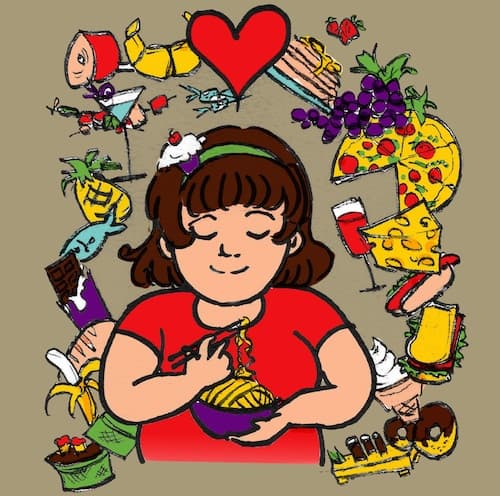Founded in Toronto, Fat Girl Food Squad is a group of writers that advocate for eating good food and feeling good inside our bodies.

ANN SHENG/THE VARSITY
Self-esteem is a prominent issue in our media-heavy world, and as Whitney Houston tells us in her 1986 hit: “learning to love yourself, it is the greatest love of all.” The Varsity talked to Kelly Bennett, Ottawa squad leader of the Fat Girl Food Squad blog community, about her take on eating and the importance of self-love.
A healthy relationship with our bodies can contribute greatly to our wellbeing, but it is often a struggle to develop a strong relationship with ourselves, and with food. “In a society where we’re constantly under bombardment from so many sources seeking to dictate our self-worth and our relationship with food, I think having a healthy relationship with food is an uphill battle,” says Bennett. “I think each person’s version of a ‘healthy’ relationship will be different; and I don’t think it’s up to anyone else to dictate what is, and isn’t the appropriate relationship.”
Advertisements for dieting, a flatter stomach, and new weight loss methods are commonplace in our society. This can cause a great deal of pressure to look a certain way, which can lead to dangerous consequences, as eating disorders are considered the most fatal of any psychiatric illness. Despite knowing the airbrushed nature of the models we see in tabloids and on TV, we sometimes cannot help being affected, perhaps even subconsciously. As Bennett believes, “fat oppression and marginalization is a systemic problem.
“I think it’s important to seek spaces where we feel safe and be aware of our language when we speak to and about others.”
A healthy relationship with food and body image is not directly reflected in physical appearance, because many factors, such as height or bone structure, are beyond anyone’s control. The right amount of food will be different for everyone. “People think they know everything about health and weight and that they are just ‘trying to be helpful’,” says Bennett. “We can’t make people’s decisions for them, and presuming we know more about them and their specific relationship with food is wrong.”
Acceptance of ourselves can be a long process, says Bennett.No one wakes up one day and suddenly loves their body: “Feeling bad for being fat one day doesn’t undo fat pride, or fat activism. It’s important to understand that these are systemic things that we’re socialized to feel, and undoing that socialization is incredibly difficult,” says Bennett. But as long as we are happy with the lifestyles we choose, confidence will follow. So remember to “eat what you want, spread fat love, spread healthy love, spread love. Spread it really good and thick.”
Tips
Aim for health, not for image. Work out and eat a balanced diet in order to maintain strength, energy, and wellbeing, not to lose weight and look skinny.
Understand that accepting your body is a very long process. It does not happen overnight. “I still get uncomfortable looking at some photos of myself – I still can’t quite bring myself to wear a crop top,” says Bennett, “it’s totally ok and normal to hate ourselves some days.” The Fat Girl Food Squad believes that the goal is to have the good days outnumber the bad ones as much as possible.
Accept that people have different body structures. Some are short and some have wide hips or flat chests. Men and women do not have to aspire for a formulaic body type.
Don’t think of terms like “fat” or “overweight” as negative or insulting. These are adjectives with highly negative connotations and are often used inappropriately.
“Be media savvy, and medical savvy, and self savvy.” Know how to read and parse media stories for linkbaiting, lies, fatphobia etc. Become knowledgeable about how the body works and how medical issues affect (but not necessarily contribute to) weight. Be aware that your doctor and many medical professionals are prone to fatphobia themselves and are complicit with that system. And know yourself; know your body, your mind and how you deal with food. Know what medical issues you have and how they’re affected by weight and food. Know your mental and emotional health and know how food and your food relationship affect that.
“Surround yourself with love and block the haters.” Use positive energy to overcome the “bad fat” days. See the beauty in everyone and let them know that they’re beautiful. “Remember what works for you is not necessarily what will work for everyone,” Bennett reminds. “Forgive yourself for moments of internalized systemic hate, they don’t make you a bad person.”
Don’t look at the number on the scale. It does not determine your worth and should not be used as a measure of success. Muscle weighs more than fat, but restricting nutrition leads to a frail body; health leads to strength.
Remember that your body does not hold you back from anything. Don’t be afraid to attend events or parties, or go to the gym, because you feel like your body will be out of place.
Remember your self-worth. Your worth is not dependent on your appearance or on how others perceive your body. You don’t owe anyone anything; don’t feel the need to excuse how you look. Have the confidence to say no and yes to sex, new opportunities, fashion styles, and everything in life.

